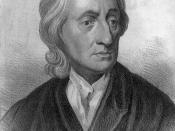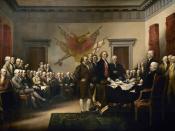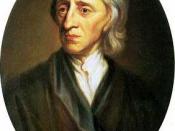"We the people," the powerful opening statement of the Declaration of Independence, is afforded its immense strength as a result of what it is attempting to achieve for the American people-- freedom. The unnamed "we" clearly has a great deal of importance, in that it can collectively agree on self-evident truths which, in turn, provide the laws of the land. Individual liberties like the rights to "life, liberty, and the pursuit of happiness," it asserts, should undoubtedly never be impeded upon by government, as this notion of freedom can be considered inherent and universal to the society (Jefferson 1). For John Locke however, liberty is first defined more or less as the ability to do as one pleases, free from a dependency on other people. Yet, Locke also recognizes that there are certain logical restrictions on this freedom, which he deems "natural law". Somewhat similarly, freedom, in Rousseau's mind, is the right to operate wholly independent of others, and to be the arbitrator and master of his own choices (Rousseau 1.1:46).
It entails being self-willed and cannot only be acknowledged as such from the simple absence of restraints. For John Stuart Mill, however, the liberty of the individual marks the primary limit on political authority. In On Liberty he contends that in the past, monarchs held power at the expense of the common people; a rather perilous methodology. He proceeds to claim that the struggle to gain liberty involved restraining such overwhelming governmental power. Drawing from these authors' varying definitions of freedom and liberty, it does seem as though it can be taken to mean whatever one wants. Yet in the context of different theorists, texts, and situations it becomes clear that different notions of freedom can be useful and all ultimately exist to protect the people.
Coinciding with this...


